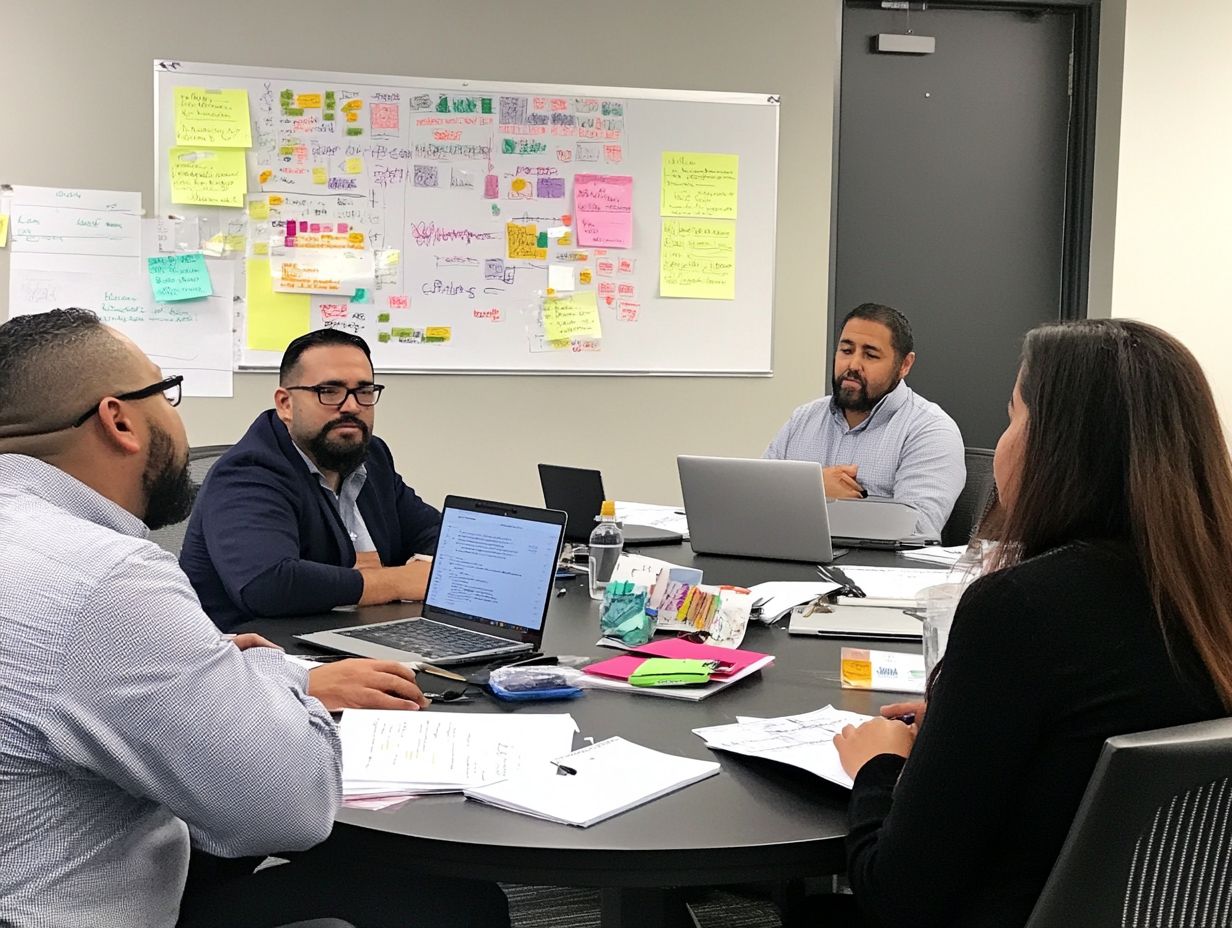Project Management Certification: Myths and Facts
Project management certification programs can truly transform your career, yet misconceptions frequently obscure their true value.
This article aims to dispel common myths while illuminating the benefits of obtaining project management certification programs, such as enhanced career growth and better salary potential.
It delves into the different types of certifications available, providing insightful guidance on how to choose the right one for your aspirations, and outlines the steps necessary to achieve certification.
Whether you re just stepping into the world of project management or eager to elevate your expertise, this guide is tailored for you.
Contents
- Key Takeaways:
- Busting Project Management Certification Myths
- Benefits of Project Management Certification
- Types of Project Management Certifications
- How to Choose the Right Certification for You
- Steps to Getting Certified
- Frequently Asked Questions
- What is a project management certification?
- Are project management certifications only for people in the IT industry?
- Is a project management certification necessary to be a successful project manager?
- Can I get a project management certification without any project management experience?
- Are there different types of project management certifications?
- Do project management certifications expire?
Key Takeaways:

Project management certification can enhance your career growth and increase job opportunities, contrary to popular myths that it is unnecessary or only for certain industries.
Choosing the right certification should be based on factors such as your career goals, industry, and preferred methodology, rather than following the crowd or focusing solely on salary increase.
Getting certified requires thorough exam preparation and completion of an application process.
Popular certifications include PMP, CAPM, and PRINCE2, each with their own unique benefits and requirements.
Understanding Project Management Certification
Project Management Certification is much more than just a credential; it s a testament to your expertise in project management principles, practices, and methodologies vital elements for any successful project manager in today s fast-paced business world.
This certification lays the groundwork for grasping the key roles, responsibilities, and skills necessary for effectively leading project teams, whether you pursue the PMP (Project Management Professional) from PMI (Project Management Institute) or courses from IIL (International Institute for Learning).
It affirms your ability to navigate the intricate landscape of project lifecycle management, ensuring that you meet project objectives and exceed client expectations.
Not only does earning a project management certification provide a significant boost to your career, but it can also enhance your earning potential and provide greater job security in a competitive market.
There are various certifications tailored to different levels of experience and specialized fields, including Agile (a flexible project management approach) and Scrum (a framework for managing complex projects).
Organizations like PMI and IIL are instrumental in creating these certifications, seamlessly integrating essential tools and techniques from the PMBOK Guide (Project Management Body of Knowledge).
This comprehensive guide becomes your go-to resource, enabling you to apply industry standards effectively and utilize relevant tools that elevate efficiency and outcomes throughout your projects.
Busting Project Management Certification Myths
Despite the growing demand for project management certification programs, many myths mislead aspiring project managers about the true value and requirements of understanding project management certifications like PMP or PMO.
This is particularly relevant when it comes to Agile methodology and its diverse applications across various industries.
Debunking Misconceptions
Debunking the misconceptions surrounding project management certification is essential if you aim to elevate your skills and achieve project success, especially when it comes to grasping the true value and applicability of certifications like PMP.
Many professionals mistakenly assume that simply holding a certification guarantees project success. In reality, success often relies on effective communication, stakeholder engagement, and adaptive leadership.
For example, a study by the Project Management Institute revealed that organizations with skilled project managers were 38% more likely to complete projects on time and within budget compared to those with certification alone.
Another common myth is that project management is strictly about following processes and methodologies. This perspective overlooks the critical importance of flexibility and creativity in tackling unique project challenges. Understanding these nuances can significantly enhance your ability to lead successful initiatives.
Benefits of Project Management Certification
The advantages of obtaining a project management certification are numerous and significant.
You can expect improved career growth, bolstered skills in project planning and resource management, and a positive influence on project outcomes and performance metrics across various industries.
This certification not only elevates your professional standing but also equips you with the tools to drive success in your projects.
Don’t miss out on opportunities get certified to stand out in your field! Take the first step towards your certification today!
Advantages for Career Growth

Obtaining a project management certification can elevate your career. It positions you for leadership roles while enhancing your professional growth through structured learning.
These certifications provide essential skills and show your commitment to the field. This makes you a more appealing candidate for promotions.
A study by the Project Management Institute shows that certified project managers earn, on average, 20% more than their non-certified peers.
Consider the success stories; one certified professional moved from a project coordinator to a Project Management Office (PMO) manager in just a few years. This transformation was possible due to the skills gained through certification.
These benefits highlight the immense value of investing in professional qualifications. They can lead to exciting opportunities to manage critical projects.
Impact on Salary and Job Opportunities
The impact of project management certification on your salary and job opportunities is significant. Certified professionals typically command higher salaries and are favored in competitive job markets.
Reports show that project managers with certifications like PMP or PRINCE2 earn about 20% more compared to those without. Surveys from hiring managers reinforce their preference for certified candidates.
Companies recognize the value of formal training in project management. This has led to a rise in job openings specifically for certified individuals, enhancing your career prospects across various sectors.
Types of Project Management Certifications
You have many project management certifications to choose from. Each is designed for different experience levels and focus areas.
The PMP (Project Management Professional) is one of the most respected certifications in the field. If you want to expand your skills further, consider the PgMP (Program Management Professional) or the CAPM (Certified Associate in Project Management).
If you prefer Agile methods, the Agile Certified Practitioner is an excellent choice. Each certification offers distinct advantages, helping you tailor your professional journey.
Overview of Popular Certifications
Popular project management certifications include PMP, PgMP, CAPM, and Agile Certified Practitioner, each providing unique benefits.
The Project Management Professional (PMP) is widely regarded as the gold standard. It requires a strong background in managing projects and understanding various methodologies.
If you oversee multiple related projects, the Program Management Professional (PgMP) emphasizes strategic alignment and governance.
For newcomers, the Certified Associate in Project Management (CAPM) offers foundational knowledge to prepare you for your first roles.
For those interested in Agile methodologies, the Agile Certified Practitioner focuses on principles essential for teams using Scrum or Kanban.
Each certification verifies your knowledge and equips you to tackle complex projects, aligning your skills with industry demands.
How to Choose the Right Certification for You
Selecting the right project management certification is crucial for your growth. It should align with your career goals and skill set.
Factors to Consider

When choosing a project management certification, consider key factors. Think about your experience level, career goals, and skills you want to develop.
Evaluating the cost of certification programs is crucial. Prices can vary significantly based on the provider and course content. Time commitment is another vital aspect. Some certifications may demand months of preparation, while others can be completed in just a few weeks.
Don’t overlook the relevance to industry standards. This ensures that the certification aligns with the latest trends and practices. To make an informed decision, research multiple options, read reviews from professionals, and reflect on how each certification aligns with your long-term career goals.
This thorough approach boosts your qualifications and sets you apart in today s competitive job market. Don t miss out on this chance!
Steps to Getting Certified
The journey to obtaining your project management certification starts with understanding the requirements.
Next, you’ll want to enroll in comprehensive training programs that equip you with the necessary skills.
Dedicating time to study relevant materials is crucial. Preparing thoroughly for the exam will help ensure a successful outcome.
Application Process and Exam Preparation
The application process for project management certification involves gathering necessary documentation, submitting your application, and preparing for the exam through focused training and effective use of tools.
First, ensure you meet the prerequisites, which typically include a certain number of hours in project management experience and specific educational qualifications.
Next, compile essential documentation, such as proof of education and a record of your project management hours worked.
Once your application is submitted and confirmed, efficient exam preparation becomes crucial. Utilizing study tools like Trello for task management, Asana for project tracking, and Slack for communication can enhance your productivity and organization.
Developing a study schedule that includes regular practice exams and group study sessions will help you feel confident and well-prepared as you approach the exam.
Frequently Asked Questions
What is a project management certification?
A project management certification validates an individual’s knowledge, skills, and experience in project management. It shows that the individual has met a certain level of competency to manage projects effectively.
Are project management certifications only for people in the IT industry?

No, project management certifications are not limited to the IT industry. While often associated with IT, these certifications benefit professionals in various fields such as construction, healthcare, finance, and more.
Is a project management certification necessary to be a successful project manager?
While a project management certification is not required to become a project manager, it can enhance your skills and knowledge in this field. It also shows potential employers or clients that you have a certain level of expertise in project management.
Can I get a project management certification without any project management experience?
Yes, it’s possible to obtain a project management certification without prior experience. However, most certifications have requirements such as a minimum number of hours in project management education or training.
Are there different types of project management certifications?
Yes, various project management certifications cater to different experience levels and specializations. Some of the most recognized certifications include PMP, CAPM, PRINCE2 (a structured project management method widely used), and Agile certifications.
Do project management certifications expire?
Yes, most project management certifications have an expiration date. People must renew their certification by completing continuing education or retaking the exam.
This helps project managers stay current with industry trends and effective techniques.






